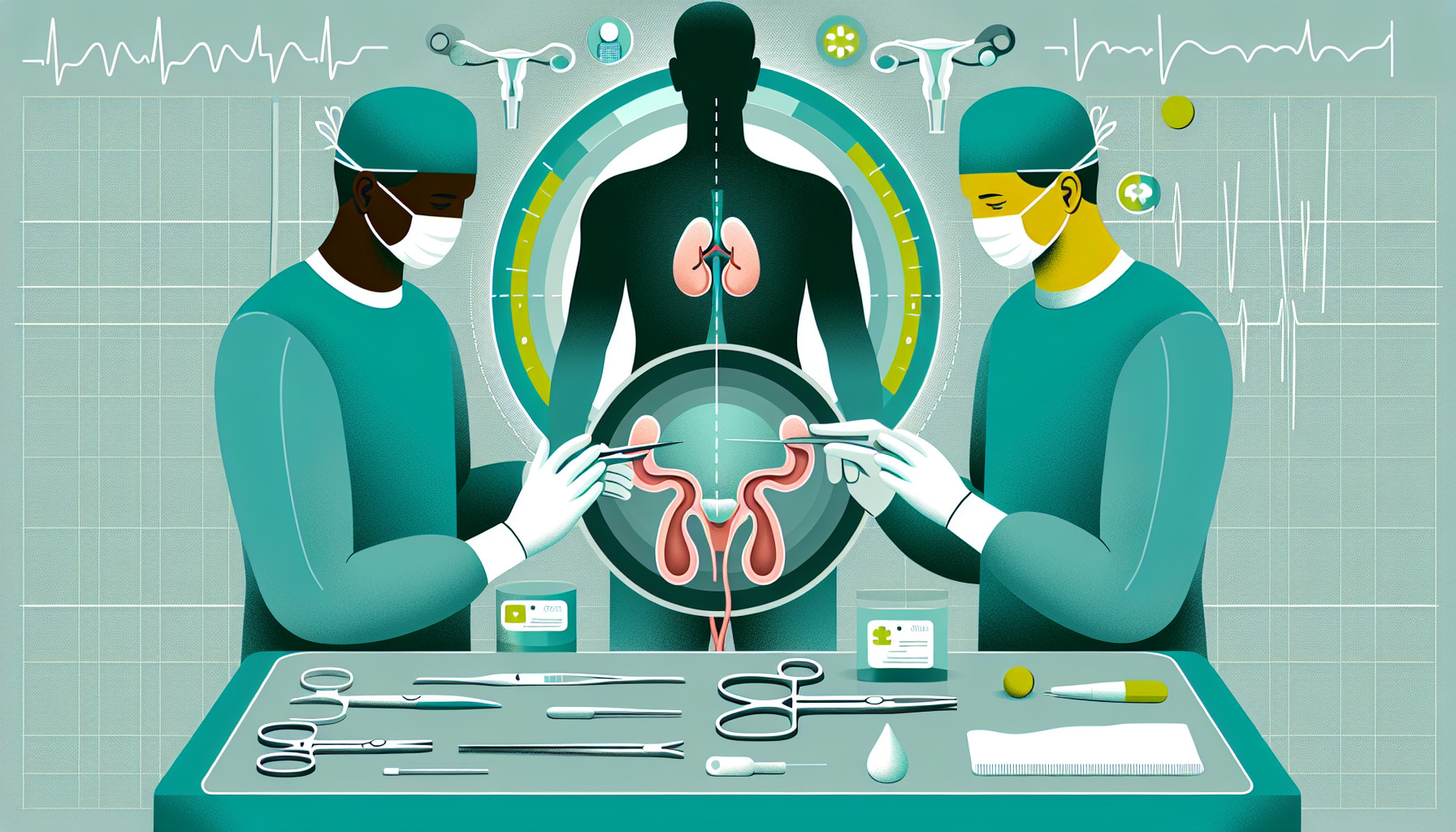Our Summary
This research paper is about a problem that can happen after a certain type of bladder cancer surgery (radical cystectomy). In this surgery, part of the small intestine is used to create a new way for urine to leave the body (urinary diversion). But when urine comes into contact with this part of the intestine, it can cause a condition called metabolic acidosis. This is when there’s too much acid in the body, and it can lead to hospital readmissions and complications.
The researchers looked at previous studies about this problem, including how common it is, how it’s diagnosed, what makes it more likely to happen, and how it’s treated. They found that it’s hard to say exactly how common it is, partly because different studies use different ways to diagnose it. They also found that it’s more common in patients with larger sections of intestine used for the diversion, those who are better at controlling their urine, and those with kidney problems. Older age and diabetes also make it more likely to happen later on. It’s the most common reason for patients to be readmitted to the hospital after this surgery.
One potential solution is to give patients at risk a treatment with oral bicarbonate (a kind of salt) for three months, which could help to prevent the condition. The researchers suggest that there needs to be a consistent approach to diagnosing, monitoring, and treating this condition, as well as preventing it in patients who are at risk.
FAQs
- What is metabolic acidosis and how is it associated with radical cystectomy?
- What are the risk factors for developing metabolic acidosis after radical cystectomy?
- What are the potential benefits of prophylaxis with oral bicarbonate for patients at risk of metabolic acidosis after radical cystectomy?
Doctor’s Tip
One helpful tip a doctor might tell a patient about cystectomy is to be aware of the risk of developing metabolic acidosis after the procedure. It is important to follow up with the healthcare team, monitor symptoms such as fatigue, confusion, and shortness of breath, and discuss preventive measures such as taking oral bicarbonate as prescribed. Maintaining good renal function and overall health can also help reduce the risk of metabolic acidosis.
Suitable For
Patients who are typically recommended cystectomy are those with bladder tumors or other conditions that require removal of the bladder. These patients may have failed other treatments or have advanced disease that necessitates surgical intervention. Additionally, patients who have undergone cystectomy with ileal urinary diversion may be at risk for developing metabolic acidosis, especially in the early postoperative period. Risk factors for metabolic acidosis after cystectomy with ileal urinary diversion include longer ileal segments, better urinary continence, impaired renal function, older age, and diabetes. Management of metabolic acidosis may involve prophylaxis with oral bicarbonate for at-risk patients. It is important for healthcare providers to closely monitor and address metabolic acidosis in patients who have undergone cystectomy with ileal urinary diversion to prevent complications and improve outcomes.
Timeline
Before cystectomy:
- Patient is diagnosed with bladder cancer
- Patient undergoes various tests and evaluations to determine the extent of the cancer
- Treatment options are discussed, including the possibility of cystectomy
- Patient prepares for surgery, including preoperative consultations and tests
After cystectomy:
- Patient undergoes radical cystectomy surgery to remove the bladder
- Patient may experience pain, discomfort, and recovery in the hospital
- Patient may receive a urinary diversion procedure, such as ileal UD
- Patient may develop metabolic acidosis as a complication of the urinary diversion
- Patient may require readmission to the hospital for treatment of metabolic acidosis
- Patient may be prescribed oral bicarbonate for prevention and treatment of metabolic acidosis
- Long-term follow-up and monitoring may be necessary to manage metabolic acidosis and other complications.
What to Ask Your Doctor
- What is the likelihood of developing metabolic acidosis after a cystectomy with ileal urinary diversion?
- What are the symptoms of metabolic acidosis that I should watch out for?
- Are there any specific risk factors that may increase my chances of developing metabolic acidosis after surgery?
- How is metabolic acidosis typically diagnosed in patients who have undergone cystectomy?
- What are the potential complications of untreated or poorly managed metabolic acidosis?
- Are there any preventative measures or treatments that can help reduce the risk of metabolic acidosis following surgery?
- How frequently should I be monitored for metabolic acidosis after the procedure?
- Is there a specific diet or medication regimen that can help manage metabolic acidosis in the long term?
- What should I do if I experience symptoms of metabolic acidosis?
- Are there any lifestyle changes or adjustments I should make to reduce my risk of developing metabolic acidosis after surgery?
Reference
Authors: Domínguez García A, Muñoz Rodríguez J, Prats López J, Almirall Daly J, Centeno Álvarez C, de Verdonces Roman L, Pla Terradellas C, Serra Aracil X. Journal: Actas Urol Esp (Engl Ed). 2023 May;47(4):195-210. doi: 10.1016/j.acuroe.2022.11.005. Epub 2022 Nov 23. PMID: 36427800
